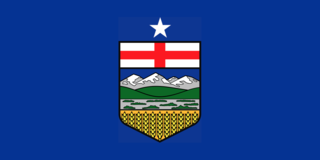
The Social Credit Party of Canada, colloquially known as the Socreds, was a populist political party in Canada that promoted social credit theories of monetary reform. It was the federal wing of the Canadian social credit movement.
There have been various groups in Canada that have nominated candidates under the label Labour Party or Independent Labour Party or other variations from the 1870s until the 1960s. These were usually local or provincial groups using the Labour Party or Independent Labour Party name, backed by local labour councils or individual trade unions. There was an attempt to create a national Canadian Labour Party in the late 1910s and in the 1920s, but these were only partly successful.
The Western Canada Concept was a Western Canadian federal political party founded in 1980 to promote the separation of the provinces of Manitoba, Saskatchewan, Alberta and British Columbia, and the Yukon and Northwest Territories from Canada in order to create a new nation.
The Western Canada Concept Party of BC is a provincial political party in British Columbia, Canada. It was the British Columbia branch of the Western Canada Concept, a political party that operated at the federal level, advocating the separation of the four western provinces of Canada and the formation of a new country comprising British Columbia, Alberta, Saskatchewan and Manitoba.
The Western Canada Concept Party of Saskatchewan was a provincial political party that was the Saskatchewan, Canada branch of the Western Canada Concept, a federal political party that advocated the separation of the four western provinces of Canada to form a new country.
The Western Independence Party of Saskatchewan was a provincial political party in Saskatchewan, Canada. It advocated for the independence of Saskatchewan and libertarian ideals. The party leader was Neil Fenske. WIP-SK was not affiliated with any federal party.
There have been various movements within Canada for secession.
The Western Canada Concept was a Canadian political party. It was founded in 1980, and promoted the separation from Canada of all provinces and territories west of Ontario.
The Western Independence Party of Manitoba was a political party in the Province of Manitoba, Canada. It was formed in 1987 by Fred Cameron, formerly the leader of the province's Western Canada Concept. It is unclear if the Manitoba WIP was simply a renamed WCC or an entirely new organization. The Manitoba WCC seems to have disappeared soon after the WIP's founding.

The Freedom Conservative Party of Alberta was an Albertan autonomist libertarian/libertarian-conservative political party in Alberta, Canada.
The 1982 Alberta general election was held on November 2, 1982, to elect members of the Legislative Assembly of Alberta.

The Western Block Party (WBP) was a federal political party in Canada, founded in 2005 by Doug Christie. The party was registered on December 29, 2005, and deregistered on January 31, 2014.

Alberta separatism comprises a series of 20th and 21st century movements advocating the secession of the province of Alberta from Canada, either by joining the United States of America, forming an independent nation or by creating a new union with one or more of Canada's western provinces. The main issues driving separatist sentiment have focused primarily on the perceived power disparity relative to Ottawa and other provinces, historical grievances with the federal government dating back to the unrealized Province of Buffalo, a sense of distinctiveness with regards to Alberta’s unique cultural and political identity, and Canadian fiscal policy, particularly as it pertains to the energy industry.
The North-West Territories Liberal-Conservative Party also known formally as the Liberal-Conservative Association prior to 1903 and the Territorial Conservative Association after 1903, was a short lived political party in the Northwest Territories, Canada. from 1897–1905. It was a branch of the federal Conservative Party of Canada.
The Western Canada Party (WCP) is a Canadian political party that advocates the separation from Canada of the provinces of British Columbia, Alberta, Saskatchewan and Manitoba as well as the Yukon, Northwest Territories and Nunavut to form a new country as Western Canada.

TheIndependence Party (TIP), is an Albertan provincial political party founded first in the early 2000s, then revived in 2017.
Autonomism is a political doctrine which supports acquiring or preserving political autonomy of a nation or a region. It is not necessarily opposed to federalism, and souverainism necessarily implies autonomism, but not vice versa.

The Alberta First Party French: Alberta d'abord) was an Albertan separatist political party in Alberta, Canada. It went through several iterations before becoming its current incarnation as the Freedom Conservative Party.

The Maverick Party, formerly known as Wexit Canada, is a Canadian federal political party. It advocates for constitutional changes to benefit, or the independence of, Western Canada, which includes British Columbia, Alberta, Saskatchewan, Manitoba, and the three territories. The party has its roots in Alberta separatism.

Wildrose Independence Party of Alberta is a provincial political party in Alberta, Canada, which was formed through the merger of Wexit Alberta and the Freedom Conservative Party of Alberta in 2020. Paul Hinman is the party’s current leader.








